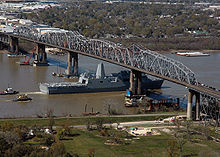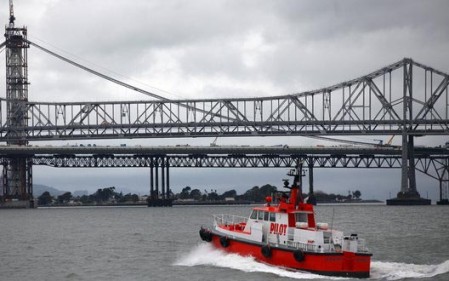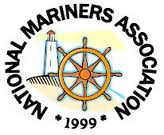
(USS New Orlean passes under the Huey P. Long Bridge north of New Orleans, LA. Photo USCG.)
The crowd was transitioning from Happy Hour to something later at the Willow Bar. The regulars were getting topped up, and the more casual patrons were cycling toward the dining room or back to their homes. I was talking to Boats, a retired Master Chief Boatswain’s Mate, U.S. Coast Guard Reserve. He has a carefully groomed short beard and an intense gaze. He is a passionate Cajun, and he is in tune with a world that is alien to me, and I spent the better part of three decades afloat or ashore waiting to go back.
I studied the pale yellow beverage in my tulip glass. Death Junior’s place had been filled to my left by Jon-no-H. Old Jim was working steadily through his daily allotment of Budweisers. John-with-and-H was next to me, talking about the LightSquared bankruptcy. He is a political operative, regardless of his place in the Executive Branch, and a bit of a duck out of water at the moment. He seemed to think LightSquared was another example of failed crony capitalism, and I tended to agree.
“Their wireless technology interferes with the Global Positioning System,” I said. “They had a waiver from the FCC only to prove that it didn’t. It did. Even the Chief of Staff of the Air Force said so. Courageous.”
“Yeah, imagine the navigation system on your car offset your position by a few dozen yards because somebody needed to talk to their girlfriend.”
“And hit a bridge,” I said grimly.
Boats spoke up. “That is what I am trying to tell you. You are concerned about a threat to land navigation, and you are just demonstrating that you are increasingly divorced from real life on the original highways of America- the rivers and inshore waterways.”
“I imagine it is like looking out from a train at the back-of-the-house of any big city,” I said. “No one rides trains anymore.”
“The American public doesn’t see it, and if you can’t see it- like from the bridge of a tow-boat on a black ass night- you can’t believe there is even a problem.
“The security of our maritime infrastructure is a big problem,” I said. “Before I retired from government we looked at what would happen if terrorists got the big Liquefied Natural Gas manifold in Boston Harbor. The city would have been toasted in the blast.”
“I agree that is a big issue, but I am more concerned about the working conditions for American mariners. That is an issue that is pressing every time our 125,000 mariners get underway. Every day of the year.”
“I thought you said it was the Jones Act that mandated the conditions,” I said querulously.
Boats sighed. “Let me take it again from the top, Vic. The Jones Act doesn’t mandate things like the two-watch system. The regulations in Title 46 Code of Federal Regulations allow it as an option, even if it an option that nearly all Jones Act vessel owners take up.”
“So, permitted but not mandated, right?”
Boats shook his head in affirmation. “I think I could do another one of those sandwiches. “And remember, the National Mariners Association is not fighting the Jones Act, we are trying to “tighten it up” along with the associated regulations. We are a “limited-tonnage” merchant mariner advocacy and watchdog group.”
“Lobbyists?” I asked. “That is a dirty word these days.”
“No we are not,” he said primly. “We engage in the political process, primarily at the national level, to improve the safety, health and social stability of our mariners.” He asked Liz-S for another sandwich, which were flying out of the kitchen and landing up and down the Willow bar. He turned back to me, saying: “The NMA is not a union. We do not organize workers within companies, or engage in collective bargaining. That is up to organized labor. We do not compete with unions, but we do our best to support them.”
“So where is the Coast Guard in all this?” I asked. “I heard one operator say that the only person who is going to rescue you is another Mariner. The Coast Guard will show up on the dock right after the television cameras.”
“Labor can’t stand the way the Coast Guard administers what the government now calls “the Merchant Mariner credentialing system.”
“I am not surprised. I heard one guy was getting ready to take a trip down the river and discovered that the government had a wrong address on file and had sent him a letter demanding a cardiac stress test. The guy never got the letter, and they yanked his papers.”
“Well, would you want a cardiac case alone at the helm with the piers of the Huey Long Bridge dead ahead?”
“I understand. But did you hear that the professional pilots who bring the big ships into San Francisco Bay are making $450,000 a year? That seems crazy.”

Boats scowled. “Those pilots- they call them “bar pilots” because of the treacherous sand bar in the approach to the Golden Gate have been at work since before the Gold Rush. They are regulated by the state, by the way, and they have managed to restrict their guild to a total of less than sixty licensed pilots. A bill that would have increased piloting rates and wages was soundly defeated last year in Sacramento.”
“I never heard of that, and I have been on big ships that pulled into the Bay. I might have seen the pilot come aboard.”
Boats nodded. “It is not a cushy job even if the pay is good. The Bar Pilots board the big ships twelve miles out, and part of the hazard of the trade is getting from the pilot boat onto the bug ships. It is dangerous. But that shows you how little the public knows about all this. They are an obscure group of workers, overseen by an even more obscure state commission. They blipped on the radar screen because of the California budget catastrophe. They were accused essentially of fraud, waste and abuse because of their compensation and the fact that they ruffled feathers by flying business class from SFO to France for training.”
“I could use some quality training,” I said, taking a sip of white. “I hate flying pretzel class.”
“It is all a labor and profits issue. The pilots say they are being vilified in a well-orchestrated campaign by ship-owners. They say they are asking for the rate increase only to ensure the safety of Northern California’s harbors as they pilot bigger and bigger ships.”
“Wait, is this all out of control?” growled Old Jim. “Why doesn’t the Coast Guard do something about the situation. Don’t they have responsibility for the marine safety?”
“Everyone is unhappy with the situation. Labor and Management feel the system is unnecessarily complex, convoluted, expensive and lacking in common sense. The credentialing process for mariners certainly contributes to the shortage of mariners, but labor feels that management’s callous attitude towards working conditions is the primary cause for the labor shortage.”
“And everyone blames the cop on the beat, right?”
Boats nodded solemnly. “Management wants to lay all of the blame at the feet of the Coast Guard. Labor wants the Coast Guard out of the marine regulatory business but management is afraid of OSHA and clings to the USCG as the arbiter of choice. Labor views the situation as rigged by management, which has contributed to the appalling working conditions that endanger your safety.”
“What?” I sputtered into my wine. “How does this affect me?”
“How about you happen to be driving across the Chesapeake Bay Bridge and a mariner who has been awake for twenty hours falls asleep and takes out a pier just as you get there.”
“Crap. That would be bad,” I said, thinking of riding the Bluesmobile a couple hundred feet down to the brown waters of the Bay. “And think what that would do to beach traffic.”
“Yeah, for months. This is going on in navigable waters all over the country. The DHS Inspector General’s Office of Audits is on the case, and they think that marine accidents are way under-reported. The NMA has known for years that only a tiny fraction of towboat and offshore supply boat industry accidents are reported to the Coast Guard. It verges on anarchy n the other side of the levee at times.”
“Is this real or political?” I said, looking at a spectacular blonde woman on the arm of someone who I realized was actually former Speaker Newt Gingrich.
“Real as a heart attack. The marine safety mission is funded on skewed data picturing an industry that is much less safe than what the Coast Guard’s pictures to Congress.” Boats gestured at the bound reports on the bar in front of me. “That is the real story. The fat one has the complete real picture of what is happening on the wet side of the levee. The thinner one is called “BLOOD ON BROWN WATER ,” and is written so simply that even Navy Squids can understand it.”
“Considering I had never heard of the Jones Act before I came here for a beef-and-weck sandwich, I will not take excessive umbrage,” I said owlishly. “Though I do think that I have had enough happy Hour White for one evening. I don’t want to hit a bridge on the way home.”
Boats tossed his card on top of the two buff volumes on the bar. “Check it out,” he said. “You might learn something about what is going happening on the wet side of the levee.”
Copyright 2012 Vic Socotra
www.vicsocotra.com
Want to know more? Check the MNA site at:

